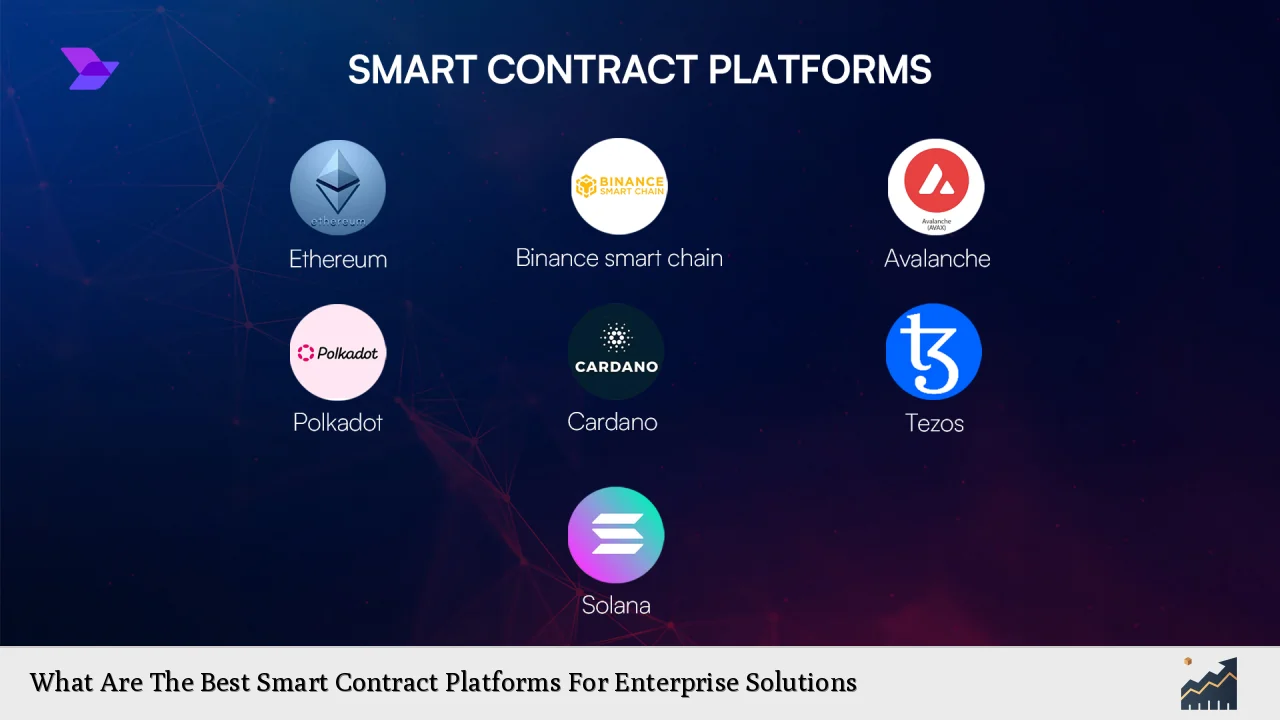Smart contract platforms have revolutionized the way businesses operate by automating processes, enhancing transparency, and reducing costs. As enterprises increasingly adopt blockchain technology, selecting the right smart contract platform becomes crucial. This article explores the leading smart contract platforms suitable for enterprise solutions, analyzing their features, market trends, and future outlook.
| Key Concept | Description/Impact |
|---|---|
| Ethereum | Pioneering platform with a vast ecosystem for decentralized applications (dApps) and a strong developer community. |
| Hyperledger Fabric | Permissioned blockchain ideal for enterprises needing modularity and confidentiality in transactions. |
| Solana | High throughput and low transaction costs make it attractive for DeFi applications, though it has faced reliability issues. |
| Polkadot | Interoperability-focused platform that connects multiple blockchains, enhancing scalability and functionality. |
| Algorand | Offers fast transaction finality and low fees, suitable for financial applications and government projects. |
| Corda | Designed for business use with a focus on privacy and security, enabling seamless integration with existing systems. |
| Tezos | Emphasizes formal verification and on-chain governance, making it secure but slower in adoption compared to competitors. |
Market Analysis and Trends
The smart contract market is experiencing exponential growth. According to Future Market Insights, the market is projected to grow from USD 230.2 million in 2024 to USD 1.9 billion by 2034, representing a CAGR of 23.8%. This growth is driven by the increasing adoption of blockchain technology across various sectors, including finance, supply chain management, and healthcare.
Current Trends
- Integration of AI: The merging of artificial intelligence with smart contracts is enhancing automation and efficiency in contract execution.
- Layer-2 Solutions: These solutions are being developed to address scalability issues inherent in many blockchains, allowing for faster transaction speeds and reduced costs.
- Focus on Security: As smart contracts handle valuable assets, there is a growing emphasis on auditing and security measures to prevent vulnerabilities.
Implementation Strategies
When implementing smart contracts within an enterprise setting, organizations should consider the following strategies:
- Define Clear Objectives: Establish what processes will be automated or improved through smart contracts.
- Choose the Right Platform: Evaluate platforms based on scalability, security features, transaction costs, and community support.
- Pilot Projects: Start with pilot implementations to test the technology in controlled environments before full-scale deployment.
- Training and Development: Invest in training for staff to ensure they understand how to develop and manage smart contracts effectively.
Risk Considerations
While smart contracts offer numerous benefits, there are inherent risks that enterprises must manage:
- Security Vulnerabilities: Bugs in the code can lead to significant financial losses. Regular audits are essential.
- Regulatory Compliance: Different jurisdictions have varying regulations regarding blockchain technology; compliance is crucial to avoid legal issues.
- Market Volatility: The cryptocurrency market can be highly volatile, impacting platforms that rely on token economies.
Regulatory Aspects
The regulatory landscape for smart contracts is evolving. In many regions, there is still uncertainty regarding the legal status of smart contracts. Organizations must stay informed about:
- Data Protection Laws: Ensure compliance with laws such as GDPR when handling personal data through smart contracts.
- Financial Regulations: Depending on the application (e.g., DeFi), different financial regulations may apply.
- Intellectual Property Rights: Clarifying ownership rights related to code and digital assets is essential.
Future Outlook
The future of smart contract platforms looks promising as they continue to evolve. Key trends include:
- Increased Interoperability: Platforms like Polkadot are paving the way for cross-chain interactions that enhance functionality across different blockchains.
- Sustainability Focus: With growing concerns about energy consumption in blockchain operations, platforms that prioritize eco-friendly practices are likely to gain traction.
- Enterprise Adoption Growth: As more businesses recognize the benefits of automation and transparency offered by smart contracts, adoption rates are expected to rise significantly.
Frequently Asked Questions About Smart Contract Platforms For Enterprise Solutions
- What are smart contracts?
Smart contracts are self-executing contracts with the terms of the agreement directly written into code on a blockchain. - How do I choose a smart contract platform?
Consider factors such as scalability, security features, transaction costs, community support, and specific use cases relevant to your business. - Are smart contracts secure?
While they offer enhanced security through decentralization and cryptography, vulnerabilities can exist in poorly written code; regular audits are essential. - Can I integrate AI with smart contracts?
Yes, integrating AI can enhance automation capabilities within smart contracts by enabling them to learn from data inputs. - What industries benefit from smart contracts?
The finance sector (DeFi), supply chain management, healthcare, real estate, and many others can significantly benefit from implementing smart contracts. - Are there any legal concerns with using smart contracts?
The legal status of smart contracts varies by jurisdiction; organizations must ensure compliance with local laws regarding data protection and financial regulations. - How do layer-2 solutions improve smart contracts?
Layer-2 solutions enhance scalability by processing transactions off the main blockchain while maintaining security and reducing costs. - What is the future of smart contract platforms?
The future includes increased interoperability between blockchains, a focus on sustainability, and broader enterprise adoption as businesses seek efficiency gains.
In conclusion, selecting the right smart contract platform is pivotal for enterprises looking to leverage blockchain technology effectively. By understanding market trends, implementation strategies, risks involved, regulatory aspects, and future developments, organizations can make informed decisions that align with their business objectives.

